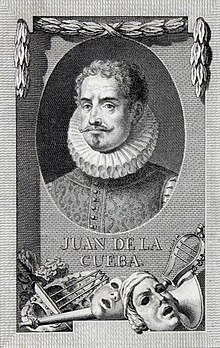Juan de la Cueva
Juan de la Cueva de Garoza (* 1543 in Seville ; † 1612 ) was a Spanish poet and playwright of the Siglo de Oro .
He lived in Cuenca , the Canary Islands and from 1574 to 1577 in Mexico ; on his return to Spain he began to write plays. He devoted himself primarily to historical and mythological topics and was one of the first to violate the classic three units of time, space and action and also mixed tragic and comic elements, which made him the forerunner of Lope de Vega , only that he was still the division maintained in four acts.
He also wrote sonnets , eclogues and odes that appeared in the collection of poems Flores de Varia Poesía .
14 plays, including: El infamador (1581, said to be the forerunner of El burlador de Sevilla by Tirso de Molina ), El Saco de Roma , La muerte del Rey Don Sancho , La libertad de España por Bernardo de Carpio and Tragedia de los siete Infantes de Lara
Further works: Viage de Sannio , La Muracinda , Llanto de Venus en la muerte de Adonis , Los amores de Marte y Venus , Coro Febeo de Romances historiales (1587). La conquista de la Bética (Seville, 1603), epic poem. El ejemplar poétco (written 1606, published 1774), a kind of literary manifesto
Title:
- Obras de Juan de la Cueva (Seville, 1582)
- Primera parte de las tragedias y comedias de Juan de la Cueva (1583)
literature
- Cueua, (Jo. De la). In: Johann Heinrich Zedler : Large complete universal lexicon of all sciences and arts . Volume 6, Leipzig 1733, column 1811 f.
Web links
- Literature by and about Juan de la Cueva in the catalog of the German National Library
- Biblioteca Virtual Cervantes (selection of works in Spanish)
| personal data | |
|---|---|
| SURNAME | Cueva, Juan de la |
| ALTERNATIVE NAMES | Juan de la Cueva de Garoza |
| BRIEF DESCRIPTION | Spanish lyric poet and playwright of the Baroque period |
| DATE OF BIRTH | 1543 |
| PLACE OF BIRTH | Seville , Spain |
| DATE OF DEATH | 1612 |
| Place of death | Seville |
